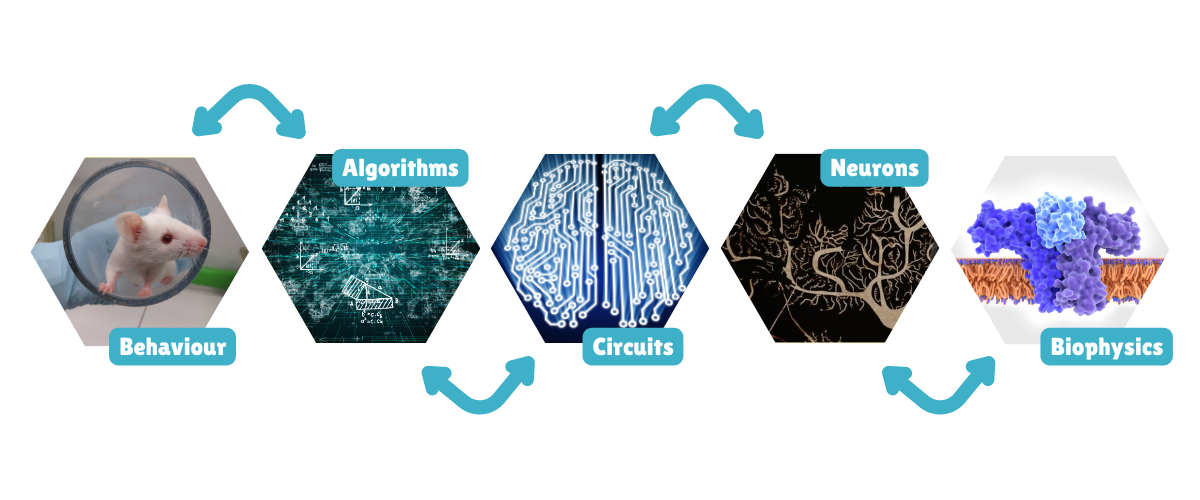
SWC's Mission
Our research mission is to discover the fundamental principles of how the brain drives behaviour.
The brain is remarkable in its ability to produce complex behaviour. While some behaviours are innate, others are learned. This range of complex behaviours enables flexible responses to changing physical and social environments. A major challenge facing science today is to understand how this richness of behaviour emerges from constituent elements of the nervous system.
At SWC, our research focuses on how information travels through biological matter. We start at the behavioural level and drill down into the networks in the brain, computations in neural circuits and individual neurons.
By working closely with the Gatsby Computational Neuroscience Unit (GCNU) we aim to provide algorithmic explanations of behaviour, while relating those algorithms to the neural activity arising in circuits composed of identified cell types with unique biophysical and synaptic properties. In the process, we hope to make significant discoveries about the neural circuit mechanisms underpinning key behavioural processes contributing to a variety of innate and learned behaviours.

Research areas
Understanding how the brain drives behaviour is a hard problem. To help us discover fundamental principles, we are concentrating our research efforts on dissecting the neural circuits of the following five building blocks of complex behaviour.
1. Perception
How does the brain encode incoming information to make sense of the world? Our research in this area focuses on dissecting the neural circuits underlying the processing of sensory information gathered from the sensory organs (the eyes, ears, nose, mouth and skin). Neuroscientists at SWC also study how the context of a given stimulus, and an animal’s behavioural state, influences perception.
2. Cognition
How does the brain abstract knowledge from the world? Our research in this area focuses on how the brain uses inferences to combine incoming information with memories and beliefs to generate internal models of the world. We are exploring how the brain dynamically updates these internal models of the world with external and internal information. Research at SWC also focuses on understanding the underpinnings of intelligent behaviour by studying how the brain uses what it already knows to generalise to new scenarios that it has never previously encountered.
3. Decisions
How does the brain use the knowledge it abstracts from the world to make decisions? Our research in this area covers both innate and learned decisions. Neuroscientists at SWC are studying how the brain computes decisions by using working memory, where information is stored for short periods, to integrate incoming information with prior knowledge. We are also disentangling how the brain chooses the most favourable decision in a given moment by exploring the impact of context, including brain state, risk and uncertainty, and social environment. To help us understand how these flexible decisions are made in real life, we are studying natural behaviours such as foraging.
4. Learning
How does the brain learn from experience, make predictions about how to behave, and remember what it has learned? Research at SWC focuses on understanding different types of learning including statistical learning, where the brain finds and exploits meaningful patterns in the environment, and reinforcement learning, where the brain makes predictions based on previous outcomes. Our research also focuses on the theory of deep learning, a class of artificial neural network models that take inspiration from the brain. Neuroscientists at SWC are working closely with GCNU, to develop better learning algorithms, a fundamental goal in machine learning that has proven essential in real world applications.
5. Planning
How does the brain set goals and transform information about the world into actions to achieve its plans? Our research in this area focuses on understanding purposeful behaviour. Neuroscientists at SWC are studying the neural circuits regulating motivation in pursuit of a goal, selection and sequencing of actions, and execution with the appropriate vigour to generate a coordinated behavioural response. Spatial navigation is a key focus area and we are exploring the role of memory, including both long-term memories for locations and short-term memories for ecologically significant information.
Find out more about our Research Areas
Research culture
We know that the fundamental principles of how the brain drives behaviour cannot be discovered by any one laboratory alone. And so at SWC, we are developing new initiatives for interdisciplinary research that cut across laboratories, experimental methods and theoretical frameworks. This includes experts from SWC, GCNU, UCL and beyond.
Together, we are working to forge a new culture in which experimentalists, theorists, engineers and data scientists learn to speak the same language and ask the same questions to achieve the goal of understanding how the brain drives behaviour.
Read more about our Research Culture